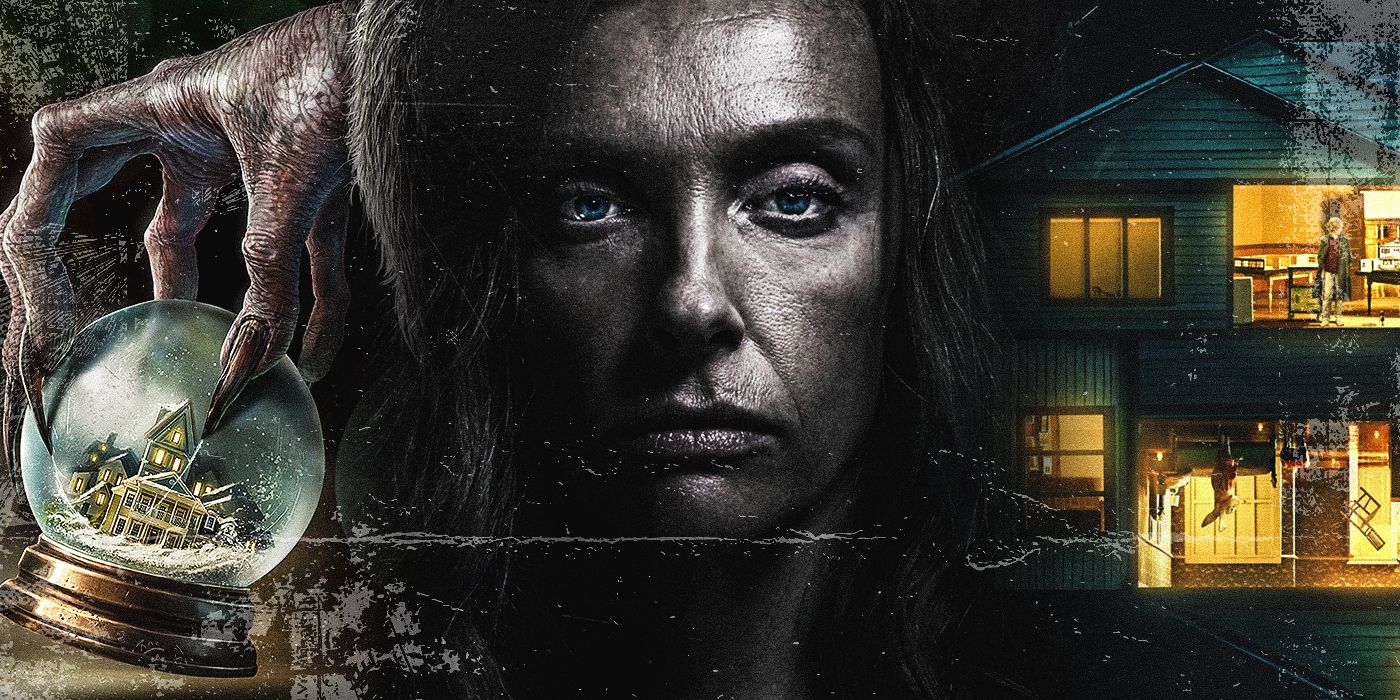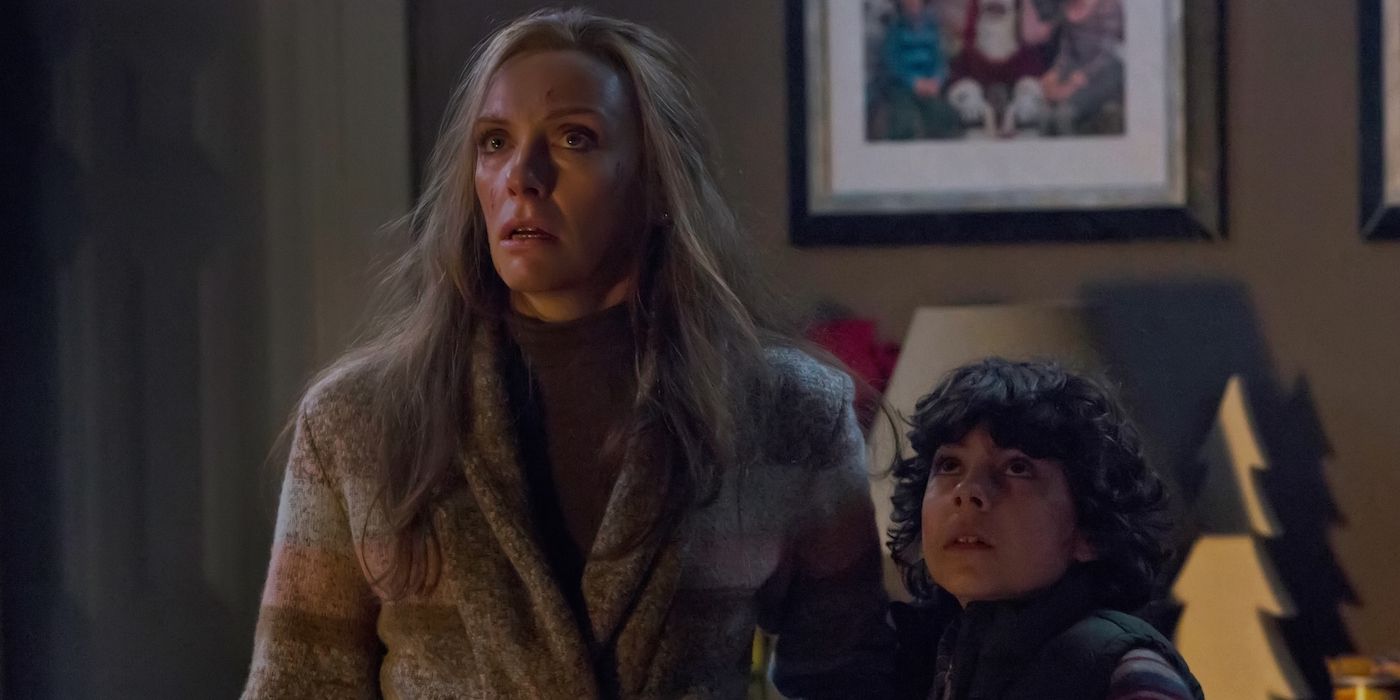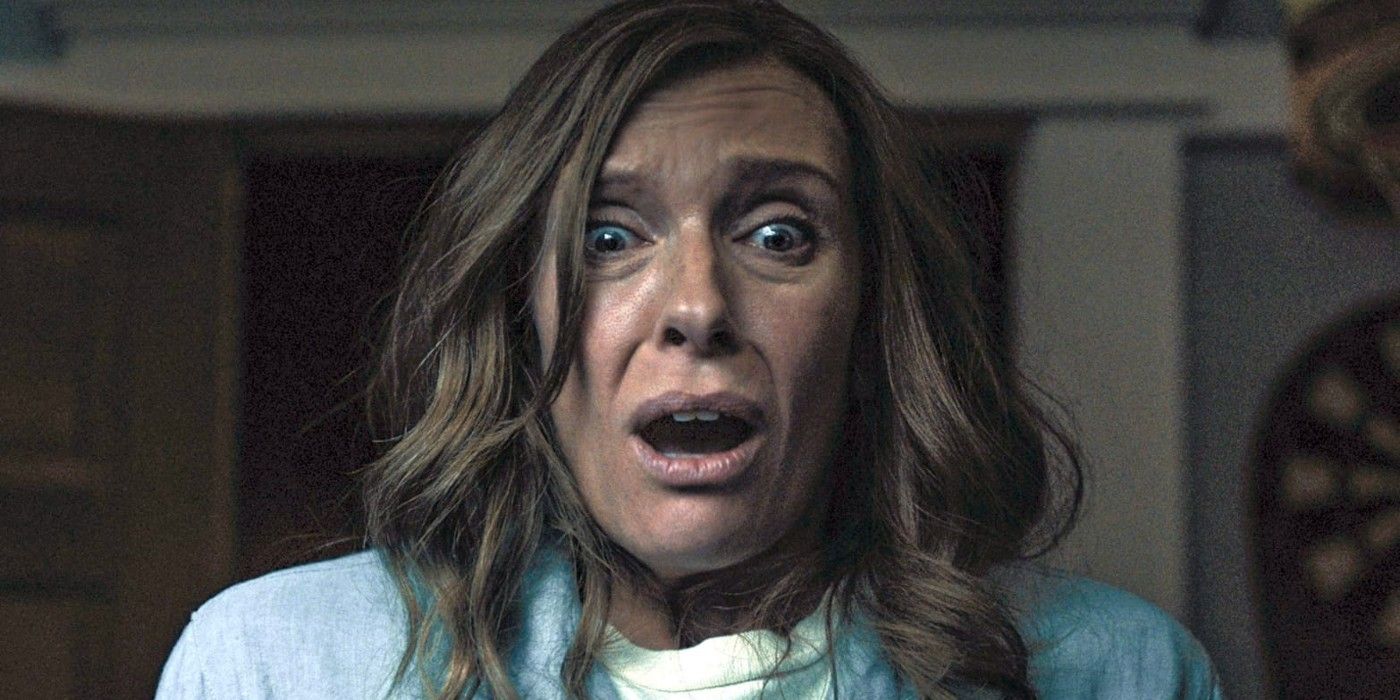Editor's note: The following contains spoilers for both Hereditary and Krampus.Toni Collette is a matriarch of a dysfunctional family, fraying to her wit's end until the whole thing pops off. When her young child discovers a surreally demonic, reality-bending, seemingly sin-punishing horror, hellish visions intersect with heightened tensions in increasingly horrific tableaus. Finally, our demon takes over the family as a vessel of their own doing, trapping them both visually and metaphorically in a dollhouse.
I'm talking, of course, about the Christmas horror-comedy Krampus. Oh, and I guess this could describe Hereditary, too.
Ari Aster's Hereditary received rapturous critical praise upon its 2018 release; Collider gave it an A-, saying that it "rises from a mere 'scary movie' to a true work of art." Conversely, Michael Dougherty's 2015 Krampus received middling reviews; while Collider gave it a better-than-most B+, we also said "it’s hard not to wish that Dougherty had fast forwarded through the dialogue-heavy, character building moments and given that screen time to zany monster attacks instead." At the risk of Krampus-clawing the hand that feeds me, I've always found the differing reactions of these two films not only to be puzzling, given their thematic, genre, and Collette-ish similarities, but indicative of the still-existing high art/low art quarry that exists in discussions about horror. Why is Hereditary allowed to transcend the genre that it fully exists in, whereas Krampus is dinged for not existing within the genre enough? Why did we all put both films in boxes?
Perhaps it's because both films are interested in putting their characters in boxes. Hereditary is bookended by the fact that all its familial players are mere dolls in a house; Krampus ends with its familial players frozen in a Christmas snowglobe. Both films end, objectively and thrillingly, with their main monsters absolutely winning, absolutely devastating, absolutely owning the main human characters. Both films, despite their searing, close-up focus on the ways family members hurt each other, are ultimately distanced from their subjects, presenting them as cautionary tableaus. However, in Hereditary, this pathos-infused, tragic ending is a foregone conclusion from frame one; as the film stomps on, the screws just get more and more twisted by Aster, providing an overwhelming, suffocating tone of darkness and destruction. Krampus, by offering the reasonable-ish question of hope and redemption for all of its characters (but especially its Christmas-loving young protagonist Emjay Anthony), actually hits me with a more surprising sledgehammer of horror in its conclusion, a bottom-falling dunking drenched with sickly irony beyond its explicitly comedic tone.
Hereditary, buzzing at the margins of its otherwise maximalist sense of gloom, is quite sickly funny itself, sometimes earning more guttural laughs from me than Krampus' more maximalist jokes. Hereditary's sense of humor is often tracked with its, to borrow a Collider Krampus quote, "zany monster attacks"; it's just that its zany monsters attacks come the most potently from its human characters, rather than the imaginatively, hilariously, grotesquely constructed creatures causing chaos in Krampus. Now, perhaps I am just a supremely fucked up individual, but when Collette tells her teenage son Alex Wolff that she never wanted to be his mother before hyperbolically slapping her hand over her mouth, trying to physically cram those words back in, I laugh deeply and bluntly — and when she goes on to calmly explain, in the matter of someone detailing an awkward but innocuous lunch, that she tried to stop the pregnancy in any way she could, the clash between heavier-than-heavy subject matter and out-of-whack delivery devastates me into shocked laughter. Krampus is full of traded barbs and pointed devastations between its "had it up to here" family members, but because their lines are pitched and played with a kind of textual broadness (i.e. no tension between what a person is saying and how they're saying it), the truest and heartiest laughs come when the film's version of zany monsters (i.e. actual zany monsters) add some jostling to their stasis.
Both films are ultimately about the horrors of being stuck in a system designed to punish and dehumanize, and both films revel in the revelation that these horrors were destined since the beginning of these familial timelines. A mysterious grandmother figure lurks over both films — the death of Kathleen Chalfant is the opening image of Hereditary, while Krista Stadler locks Krampus' midpoint into expositional shape. But while the knowledge of the true motivations of these family leaders, these family starters share thematic similarities, the films use them in slightly different ways. In Hereditary, when we eventually learn that Chalfant was the leader of a coven trying to summon the demon Paimon into the bodies of her family members, it is the absolute snuffing out of any hope; the sheer, brutal, screamed realization that one's hereditary lineage was always going to lead one to annihilation. But in Krampus, when we learn of Stadler's personal history with Krampus, it still leaves that precariously dangling modifier of hope over the fiery edge. Krampus appears after a family loses its healthy Christmas spirit, leaving behind a bell ornament to one survivor as a kind of brutal signifier that hope can remain an option. You survived, and you can teach the lessons to your further hereditary lineage to avoid these kinds of monsters from reappearing again. In Hereditary, the fact that a hereditary lineage exists equals the end from the beginning.
Both films end with our main male sons surviving, surrounded by a family unit of sorts offering them nothing but positive reinforcement. And in both films, this "positive reinforcement" is clearly colored by the demonic forces of fate that froze them, that encapsulated them into a pathetic, sealed-off wide shot of ownership, that toys with them and turns them into toys. The biggest difference between these two films, thus, is not the fact that one's a Christmas horror-comedy and one's a grief-driven horror-drama, nor is it that one's a critical darling and one's a critical curio at best. It's what each film says, beyond the boxes we put them in, about the boxes they're interested in wrapping. It's the difference between a present you know is full of broken glass from the start and a present that just might be a new BMX bike until it flings broken glass at you anyway.
Which gift would you rather open? And most importantly: what did you get Toni Collette for Christmas?
Krampus: The Naughty Cut is now available on 4K blu-ray from Shout Factory. Hereditary remains available on 4K blu-ray from Lionsgate Films, and can currently be streamed on Kanopy.



